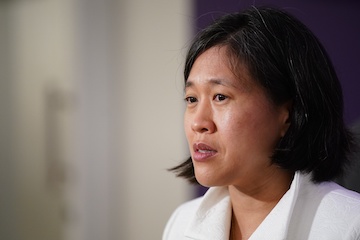President Joe Biden’s top trade official reaffirmed the United States’ commitment to reforming the World Trade Organization in a speech aimed at blunting criticism that the US is slow-rolling efforts to update the trade body’s decades-old rulebook.
In remarks to the Center for Strategic and International Studies in Washington Friday, Trade Representative Katherine Tai said she and her US colleagues are “rolling up our sleeves” to advance a comprehensive reform agenda that will improve transparency, bolster the WTO’s negotiating function, and repair its dispute-settlement system.
“The goal here is not restoring the appellate body or going back to the way things used to be,” Tai said. “It is about providing confidence that the system is fair. And revitalizing the agency of members to settle their disputes.”

Appellate-Body Paralysis
The paralysis of the WTO’s appellate body has made it more difficult for WTO members to obtain trade justice at a time of increasing economic tensions across the globe. While countries can still file disputes at the WTO, a losing party can easily veto WTO rulings by appealing into the institutional ether.
That’s increased uncertainty for businesses operating abroad and raised systemic concerns about whether US obstructionism will reduce the legitimacy of the WTO’s rules based system in favor of a power based trading system.
Indeed, the appellate-body impasse has coincided with a sharp rise in trade restrictive measures, like tit-for-tat tariffs, illegal subsidies and other harmful barriers to trade.
‘Fair and Effective’
Tai said the US wants a dispute settlement system that “is fair and effective and supports a healthy balance of sovereignty, democracy, and economic integration.”
While the Biden administration’s goals remain somewhat vague, the administration offered a window into its thinking this summer when it circulated a two-page document outlining 10 overarching goals for reforming the WTO’s dispute settlement function.
Tai honed in on four specific goals during her speech:
- Offering “practical and appropriate alternatives to litigation”
- Limiting dispute rulings to “only what is necessary to resolve the disputes”
- Ending “judicial overreaching and restore policy space”
- Seeking to “correct WTO panel reports that have asserted that the WTO may second-guess members’ legitimate national-security judgments.”
Last December, Tai said the WTO was “getting itself on very, very thin ice” after it ruled that the US erred when it claimed Trump’s steel and aluminum tariffs were exempt from WTO oversight due to national-security concerns.
Skepticism Runs High
But Tai’s speech may ring hollow among US allies and foes who have seen the Biden administration make scant use of the system — opting instead to appeal many of its losing cases into the legal void left by the paralysis of the appellate body.
During Biden’s first three years in office, the US has filed no dispute-settlement cases as a plaintiff and has instead engaged in bilateral talks with its most important trading partners to resolve trade disputes outside of the WTO’s umbrella.
At the same time, the Biden administration has maintained Trump’s WTO-illegal tariffs on billions of dollars worth of Chinese imports and triggered a global subsidy race after offering massive funding for domestically produced green goods in the Inflation Reduction Act.
Biden has also continued his predecessor’s practice of blocking all new appointments to the defunct WTO appellate body, despite repeated requests from a large majority of the organization’s 164 members to restart the appointment process immediately.
US Reform Goals
Next month, the WTO will host a senior officials meeting in Geneva to discuss their 2022 pledge to restore a “fully and well-functioning dispute-settlement system” by 2024.
WTO Director-General Ngozi Okonjo-Iweala has expressed hopes that the meeting will help create the impetus for members to make concrete decisions at their 13th ministerial conference, which is scheduled to be held in Abu Dhabi in February.
But expectations for a breakthrough remain low because the 2024 deadline falls during a US presidential election year and trade officials agree that the Biden administration would be hard-pressed to spend political capital to repair a system that’s failed to temper China’s worst trade abuses.










